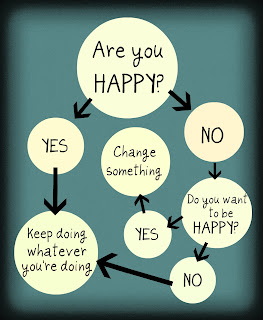For the past few posts, we've been discussing the Four Noble Truths, which (in an overly simplistic manner) are that suffering exists in our lives, that we cause much of it ourselves through our attachments, aversions, and ignorance, that we don't have to suffer, and that there is a path to freedom from suffering. This is often perceived as being somewhat dismal. I'd like to suggest a different way to frame it, however (based on a talk given by Gil Fronsdal).
Although the goal of the Buddhist path is liberation from suffering, we don't usually talk about what happens after we achieve that goal. What does Nirvana look like? There are good reasons why there is very little written about what the goal should look or feel like. First, there is not necessarily only one way to experience it, so anything I could describe would not be accurate for many people. Second, once described, it creates an ideal that people would cling to, and this clinging would prevent them from achieving it. Nonetheless, it is possible to give a better sense of what the goal is if we reframe the Four Noble Truths from the positive side.
Nothing exists without its opposite, and the flip side of suffering is ease. As we've noted before (here and here), happiness isn't actually the opposite - the way most Americans think about happiness is actually a form of suffering! We really want to be able to experience the richness of our lives (the joys, the sorrows, the frustrations, the challenges) with a sense of ease, slipping through each experience with a sense of ease. We could, therefore, repackage the Four Noble Truths from this perspective.
First Noble Truth: The possibility of ease exists.
Second Noble Truth: It is possible to lose the ease.
Third Noble Truth: It is possible to regain the ease.
Fourth Noble Truth: There is a path by which we can regain and maintain the ease.
Personally, I find this to be a really motivating approach, partly because it fits with where I am in my practice. This wasn't always the case, however. There have been times when my suffering was so intense that I needed to do something about it, and that was the total focus of my motivation. Whether we are motivated to practice because of a focus on the suffering or a focus on the lightness and ease doesn't really matter much. The focus on suffering may be a more realistic spiritual path, because it's grounded in what's actually happened in your experience, rather than a focus on an ideal of peace in the future.
Nonetheless, there often comes a time when people have an experience of ease that is personal, direct, and visceral, and then the ease no longer functions as some idealized state, but one that you have some experience with. Ease now can become the teacher, as Gil Fronsdal says, particularly when you argue with it.
The argument question is, for what is it worth sacrificing my ease?
We often cling to our suffering, as if it were important. Some people even seem to base their sense of self on worrying or complaining.
I know several people who always complain about everything, as if somehow that makes them feel better - yet, they never stop complaining, so it clearly isn't working. All that practicing has made us expert at complaining, so it becomes automatic. Sometimes we believe it is important to worry or to plan, and sometimes it is. So this is the question - is now one of those times? Will I really perform some task better if I sacrifice feeling comfortable and at peace and instead worry, plan, and complain?
Once we find this sense of ease, we can practice it until it becomes automatic too. It can become the default. It is important to realize that this is not the same as indifference, which is a state of being closed off to the world. On the contrary, it is becoming open to every possibility, able to work with whatever arises in each situation. It becomes a stable platform from which we can see clearly in all directions, and therefore be of much greater help to everyone around you (as well as yourself).
I should probably end this post here, but in the interest of providing the whole truth it is worth noting an obstacle on this journey. We began this series of posts looking at why people may be afraid to meditate, and there is at least one more reason that is relevant here. Buddhist meditation forces us to confront how we have acted unskillfully, harming ourselves and others in the process. This honest appraisal allows us to have the motivation necessary to change the patterns. Nevertheless, some people stop meditating precisely because it makes us confront these uncomfortable feelings of how we have been injured and how we have contributed to the injuries. If you believed that meditation was just a stress reliever, then facing this will be disheartening, and many people stop here. Yet, if we can go through this, learning from the insights that arise, we can get to a place of ease that is profoundly different from where we normally live.
Although the goal of the Buddhist path is liberation from suffering, we don't usually talk about what happens after we achieve that goal. What does Nirvana look like? There are good reasons why there is very little written about what the goal should look or feel like. First, there is not necessarily only one way to experience it, so anything I could describe would not be accurate for many people. Second, once described, it creates an ideal that people would cling to, and this clinging would prevent them from achieving it. Nonetheless, it is possible to give a better sense of what the goal is if we reframe the Four Noble Truths from the positive side.
Nothing exists without its opposite, and the flip side of suffering is ease. As we've noted before (here and here), happiness isn't actually the opposite - the way most Americans think about happiness is actually a form of suffering! We really want to be able to experience the richness of our lives (the joys, the sorrows, the frustrations, the challenges) with a sense of ease, slipping through each experience with a sense of ease. We could, therefore, repackage the Four Noble Truths from this perspective.
First Noble Truth: The possibility of ease exists.
Second Noble Truth: It is possible to lose the ease.
Third Noble Truth: It is possible to regain the ease.
Fourth Noble Truth: There is a path by which we can regain and maintain the ease.
Personally, I find this to be a really motivating approach, partly because it fits with where I am in my practice. This wasn't always the case, however. There have been times when my suffering was so intense that I needed to do something about it, and that was the total focus of my motivation. Whether we are motivated to practice because of a focus on the suffering or a focus on the lightness and ease doesn't really matter much. The focus on suffering may be a more realistic spiritual path, because it's grounded in what's actually happened in your experience, rather than a focus on an ideal of peace in the future.
Nonetheless, there often comes a time when people have an experience of ease that is personal, direct, and visceral, and then the ease no longer functions as some idealized state, but one that you have some experience with. Ease now can become the teacher, as Gil Fronsdal says, particularly when you argue with it.
The argument question is, for what is it worth sacrificing my ease?
We often cling to our suffering, as if it were important. Some people even seem to base their sense of self on worrying or complaining.
I know several people who always complain about everything, as if somehow that makes them feel better - yet, they never stop complaining, so it clearly isn't working. All that practicing has made us expert at complaining, so it becomes automatic. Sometimes we believe it is important to worry or to plan, and sometimes it is. So this is the question - is now one of those times? Will I really perform some task better if I sacrifice feeling comfortable and at peace and instead worry, plan, and complain?
Once we find this sense of ease, we can practice it until it becomes automatic too. It can become the default. It is important to realize that this is not the same as indifference, which is a state of being closed off to the world. On the contrary, it is becoming open to every possibility, able to work with whatever arises in each situation. It becomes a stable platform from which we can see clearly in all directions, and therefore be of much greater help to everyone around you (as well as yourself).
I should probably end this post here, but in the interest of providing the whole truth it is worth noting an obstacle on this journey. We began this series of posts looking at why people may be afraid to meditate, and there is at least one more reason that is relevant here. Buddhist meditation forces us to confront how we have acted unskillfully, harming ourselves and others in the process. This honest appraisal allows us to have the motivation necessary to change the patterns. Nevertheless, some people stop meditating precisely because it makes us confront these uncomfortable feelings of how we have been injured and how we have contributed to the injuries. If you believed that meditation was just a stress reliever, then facing this will be disheartening, and many people stop here. Yet, if we can go through this, learning from the insights that arise, we can get to a place of ease that is profoundly different from where we normally live.




















